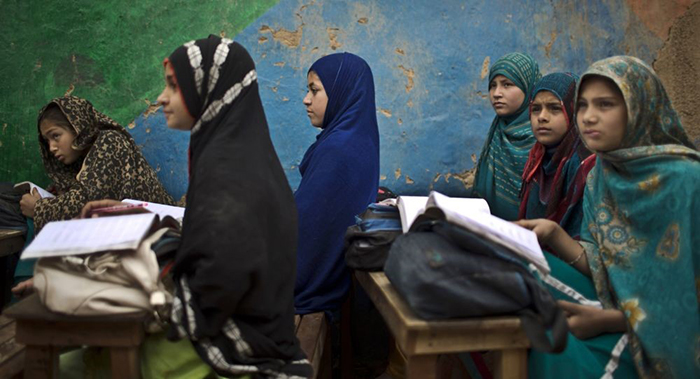Amid war and violence, attending school remains a yet-unfulfilled dream for a large number of Afghan girls. Thousands of young Afghan girls in southern Helmand province are out of school. Schools are closed down in 13 districts of the province, and just a small number of girls in Lashkargah, the provincial capital, and Nahri Saraj district, are able to attend schools. Reports say that of the whole young female population, only an estimatedly 700 girls completed high school in 2018.
The unrest southern province of Helmand is disrupted by violence and war, and people lose their lives on daily basis.
We have a wrong culture that does not allow girls to attend school when they grow up,” said Bashir Ahmad Shaker, member of the provincial council in Helmand.
People feel ashamed of sending girls to get education in the province,” he noted.
Afghanistan’s 18-year-old bloody war is a major obstacle that withholds a large number of girls from attending school. According to the Afghan Ministry of Education, 18 thousands schools were built for 9.5 million students across the country.
Amid a bloody war fought between the government forces and the insurgent groups, school buildings most often serve as shields for the parties involved in the conflict. Out of 18 thousand schools, 430 schools have permanently been closed due to ongoing conflict. In Helmand province, out of 202 thousands students, 50 thousands of them are girls. But most of them cannot complete their primary education.
For the time being, as many as 76 schools remain closed due to ongoing conflict in Helmand. Daud Shah Safari, head of the provincial directorate of education, describes insecurity as a major obstacle ahead to reopening schools in the province. “Some schools are located far away from houses of people,” Safari said. “Most people are not willing to send their girls so far as these schools are located.”
Cultural restriction is another reason that bars girls of going to school. Safari underlines that most uneducated parents do not allow their daughters to attend school. Parents force their daughters wed off as they grow up.
In 2018, in a cooperation with education officials, locals reopened as many as 300 schools. They were passionate to see schools reopened but delay in payment of the salary of school teachers coupled with lack of educational resources depressed them about the future of their children. “People are unwilling to cooperate,” said Safari. “We convinced the Taliban to let us reopen the schools. We did it, but there are not teachers, books, boards and even buildings,” he said, quoting the locals.
Despite all odds against girls’ education, locals and officials have initiated a campaign in the province. They encourage parents to enroll their daughters in schools and allow them get education.
“Who will become doctor or teacher when we do not allow ours girls to attend schools,” read a campaign billboard in Helmand.




